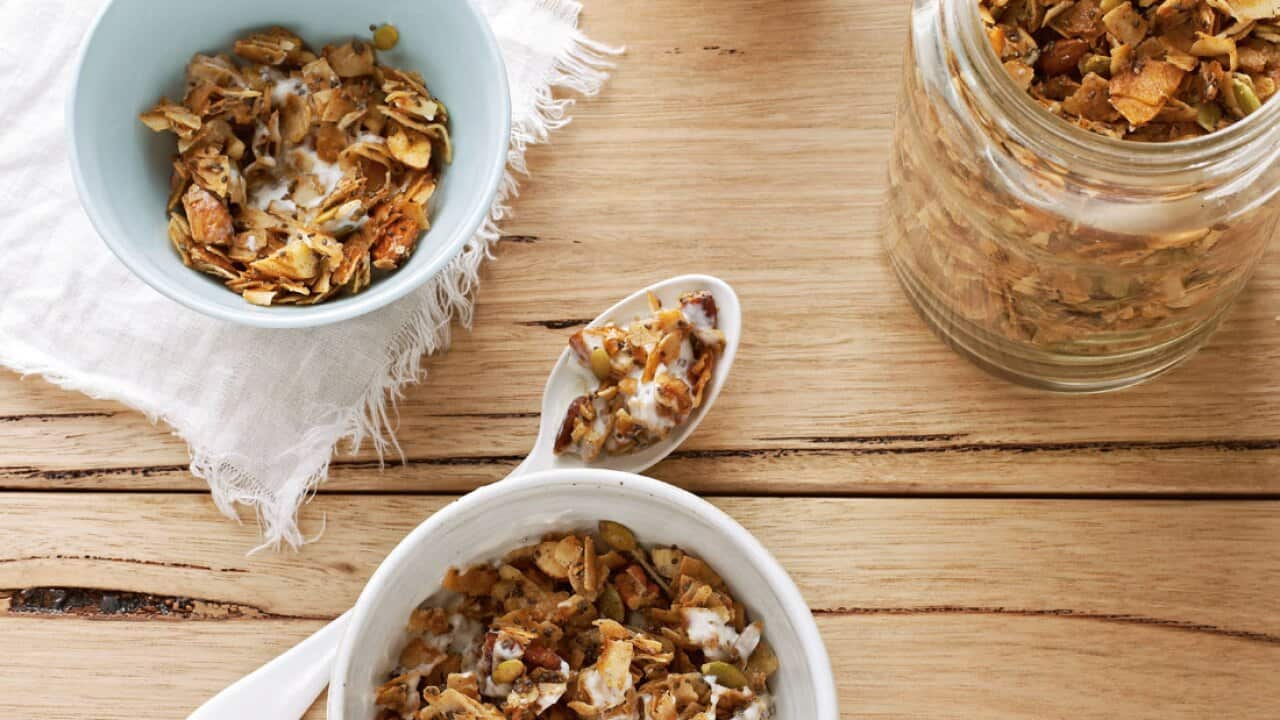“What the hell does it mean when foods are ‘activated,’ as in ‘Activated Turmeric, Coconut & Lime Pepitas?” a colleague wondered in a recent email.
Funny he should ask: One of the vegans in my life is enthralled with activating raw organic almonds and cashews, which involves soaking the nuts for six hours or so, then drying them in a low oven or dehydrator for up to 24. “It’s so much cheaper to do your own!” she explained. “And it’s not laborious at all — it’s unattended time.”
It may be all that and a bag of chips, but why bother?
Well, the lengthy process does result in a flavor and texture kinda sorta like that of roasted nuts, but more importantly, many vegans, , and other proponents (many of whom suffer from digestive disorders such as irritable bowel syndrome) believe that activation makes nuts and seeds more easily digestible and nutritious by reducing the effects of their phytic acid(aka phytates), the primary form of phosphorus storage in many plants, including grains, legumes, oil seeds, and nuts. Phytic acid binds to minerals such as iron, zinc, and to a lesser degree, calcium and impairs absorption in the body.
“This applies to a single meal, not overall nutrient absorption throughout the day. In other words, phytic acid reduces mineral absorption during the meal, but doesn’t have any effect on subsequent meals,” explained nutritionist Atli Arnarson for . “For example, snacking on nuts between meals could reduce the amount of iron, zinc and calcium you absorb from the nuts, but not from the meal you eat a few hours later.”
For people who live on a subsistence diet ... leveraging the bioavailability of minerals may make a profound difference... that doesn’t explain why those of us who enjoy a healthy, well-balanced, varied diet find ourselves in the midst of a phytate phobia.
Soaking or sprouting grains, legumes, seeds, and nuts has long been a tradition in many cultures. If nothing else, it allows dried beans and to plump up nicely and cook more quickly and evenly. For people who live on a subsistence diet and rely heavily on one or two staple grains or legumes, leveraging the may make a profound difference.
All that doesn’t explain why those of us who enjoy a healthy, well-balanced, varied diet find ourselves in the midst of a phytate phobia. It’s buoyed in large part by testimonials from celebrities (including chef , who was widely mocked for his three o’clock snack) and come-hither marketing copy from businesses like Moon Kitchen, founded by juice-and-herbal-dust queen Amanda Chantal Bacon and producer of the pepitas mentioned above. “We activate all of our nuts and seeds using to awaken their dormant powers, increase digestibility and absorption of minerals, and reduce phytic acid, which can cause bloating and breakouts. We say ‘activate’ not sprout, because we don’t take it all the way to the green sprouting stage,” she wrote on .
Aha! I was wondering what the difference between activating and plain old sprouting (the germination of seeds, legumes, or grains) was, and now we know.
Much of the fear of phytic acid stems from its being known as an antinutrient, like glucosinolates, lignans, saponins, lectins, tannins, and other naturally occurring chemical compounds in plant foods that inhibit (but do not entirely block) bioavailability. Outside the scientific community, the word antinutrient is greatly misunderstood — it’s perceived as a bad thing — and that’s a real shame, for the compounds are prized for their health benefits. , for example, are what give broccoli and other vegetables in the their cancer-fighting powers. Phytic acid, as it turns out, has , and according to Arnarson, it “may be protective against and . It has even been suggested that phytic acid might be part of the reason whole grains may cut the risk of .”
So what’s the takeaway? Nuts and seeds are nutritious foods. Whether they are activated or not, they’re satisfying sources of vitamins, minerals, , protein, and healthy fats. “A series of large studies, including the Nurses’ Health Study of 76,464 women and the Health Professionals Follow-Up Study of 42,498 men, found that the more nuts people consumed, the less likely they were to die at any given age, especially of cancer or heart disease,” wrote Jane Brody for in 2015. “However, these studies were conducted almost entirely among relatively well-to-do, well educated, white individuals, and despite the researchers’ care in controlling for other factors that could have influenced the results, there remained the possibility that characteristics of the participants other than nut consumption could account for their reduced death rates.”
“Now, strong links between nuts and peanuts and better health have also been found in a major study of people from lower socioeconomic backgrounds and varied ethnic groups — blacks, whites and Asians — many of whom had serious risk factors for premature death, like smoking, obesity, high blood pressure and diabetes,” Brody added. “The results were published in March in JAMA Internal Medicine by researchers at Vanderbilt University School of Medicine. Their study, conducted among more than 200,000 men and women in the Southern United States and Shanghai, found that the more nuts people consumed, the lower their death rates from all causes and especially from heart disease and stroke.”
So, go nuts - whether that's splurging on more expensive activated raw seeds and nuts, going to the effort to activate them yourself or just eating more natural nuts.
yes to nuts

Spiced nuts


